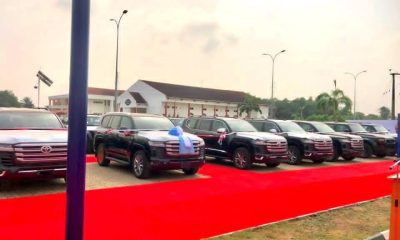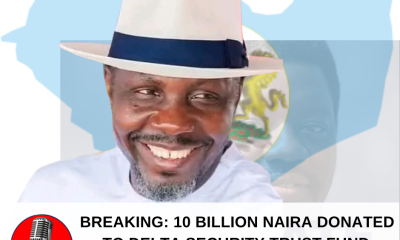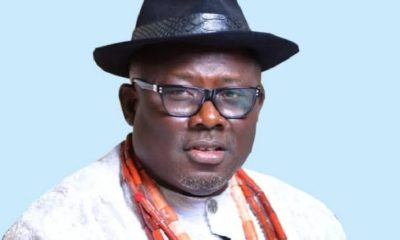Opinion
13% Derivation; DESOPADEC and Oil and Gas Host Communities.

By Jerome-Mario Chijioke Utomi.
A cursory look at the Oil and Gas host communities in Delta state reveals an area tensed up with a lot of issues, intrigues and hiccups. Their anger in the present moment, going by media reports, is precipitated by the alleged opaque manner the former governor of the state, Senator Dr Ifeanyi Okowa, managed the 13% Oil Derivation Fund that accrued to the state.
Correspondingly, It will not be characterized as hasty to conclude that there is presently in Delta state no agency or commission that is troubled as the Delta State Oil Producing Area Development Commission(DESOPADEC), an agency created by the enabling Act in Delta state, to secure 50% of the 13% Oil Derivation Fund accruing to Delta State government and the received sum used for rehabilitation and development of oil-producing areas of the state as well as carry out other development projects as may be determined from time to time.
Supporting the above assertions is a recent statement by Edwin Clark, convener of the Pan-Niger Delta Forum (PANDEF), where he alleged that Ifeanyi Okowa, former governor of Delta, misappropriated the state’s derivation fund amounting to N1.760 trillion. Pa Edwin’s bombshell was followed in quick succession by protest staged in Abuja by representatives of the Delta state Oil and gas host communities, calling on Economic and Financial Crime Commission (EFCC), to investigate the immediate past Governor of Delta State, Ifeanyi Okowa, for allegedly misappropriating over N1tn oil derivation fund belonging to the state during his tenure.
While the coastal dwellers in their statement insisted that the former governor unlawfully diverted the aforementioned sum, the former Governor’s men are at work, thwarting every attempt to rubbish the reputation of their former boss. For instance, the immediate-past Commissioner for Information in Delta State, Ehiedu Charles Aniagwu, recently told the world that all the money Okowa’s administration got from Federation Account Allocation Committee, including derivation for the whole period in office amounted to N2.1trn and therefore described as wild goose chase HOSTCOM’s narrative on N1trn.
But in all this, what this piece observed could be safely categorized into three parts; first, Senator Okowa’s led government brought to the oil and gas host communities flashes of streets/internal roads.
Beyond this acknowledgement, there exists also in the state a deeply neglected coastal area which doubles as oil and gas host communities where poverty, disease and illiteracy walked their creeks, rivers and estuaries and as a resultant effect, forced many children out of school not because of their unwillingness to learn, but occasioned by non availability/provision of schools in the area by the government. These are verifiable facts!
A movement by boat from Egbema Kingdom in Warri North Local Government Council to Gbaramatu Kingdom in Warri South, from Ogulaha Kingdom in Burutu Local Government to Kabowe in Patani Local Government Area, down to Bomadi Local Government Local Councils, among others, reveals a seemingly similar experience. They are all oil and gas bearing kingdoms and communities and play host to major crude oil platforms operated by the International Oil Companies (IOCs), but they have nothing to show for it.
Secondly, without going into critical analysis of claims by the immediate past Governor of Delta State, Senator Dr Ifeanyi Okowa, that DESOPADEC got what was due to it according to the law establishing it, this piece believes that such declaration on DESOPADEC receiving a total of N208 billion in the eight years of his administration, as its rightful statutory funds appears inaccurate and, therefore, cannot hold water when faced with embarrassing arguments.
DESOPADEC, as noted in the first paragraph, is to secure 50% of the 13% Oil Derivation Fund accruing to Delta State government. With this in mind; is the former Governor saying that it was only 416 Billion naira that accrued as 13% derivation to the state in the past 8years, which summed DESOPADEC’s statutory 50% to N208 billion? Again, instead of giving a cumulative amount received from the Federation Account Allocation Committee, what stops the former Governor and his supporters from specifying the exact amount received as 13% derivation?
While answer(s) to the above questions raised is awaited, the third and most dramatic point is DESOPADEC-specific. The non satisfactory development of the area within this period under review in my view remains an emblematic sign that the affairs of the coastal areas of the state was handed over to a bunch of politicians masquerading as leaders but lack public leadership acumen and orientation. To use the words of a public affairs commentator, they were people that ‘spend more time with wines than with books’.
Aside from turning the coastal part of the state to an endangered species via wicked human capital neglect and infrastructural abandonment, these ‘leaders’, in turn, neglected community relations and communication. And because of this non-participatory leadership style and engagement, each time communities ask for bread, the agency makes ‘stones’ available and when the communities ask for fish, DESOPADEC provides a ‘snake’.
This piece will highlight two recent separate but related examples to support the above claims.
In October 2022, it was in the news that in the face of grave developmental challenges confronting the coastal dwellers in the state crying for attention, DESOPADEC leadership against all known logic opted for the donation of 50 grass-cutting machines to the people of Okerenkoko community in Gbaramatu Kingdom, Warri South-Local Government Area of Delta state. Presenting the machines, the DESOPADEC commissioner noted that the donation of grass-cutting machines to the community was statutorily captured in the commission’s 2021 budget; adding that the project was principally influenced by him”.
For those that are not conversant with the Okerenkoko community and may be tempted to believe that the donation was a right step taken in the right direction, they may see nothing wrong with the donation. But for someone that is familiar with the aforementioned community, the decision to donate these machines qualifies as a misguided priority.
In fact, there is everything wrong with the development. For instance, there is evidence which points to the fact that the community was neither consulted nor carried along before the decision was made. The grass-cutting machine donation, in the opinion of this piece, failed the NEEDS assessment stipulations.
The words of the youth leader from the community support this assertion.
Reacting to the development, the youth leader who spoke on behalf of the community among other things, said, “We heard about the skill acquisition that is ongoing. We are appealing to the Commissioner to at least create some avenue for those skill acquisitions for our ladies, for the youth in this community so that they can go out there and learn skills to back themselves, put themselves in order.”
From the above comment, one thing stands out; the fact that if given the opportunity, these knowledge-hungry youths in the community, who will provide the future leadership needs of the country, would have opted for skill acquisition. Instead of grass-cutting machines, the youths in the community would have preferred access to good schools where they will learn and compete with their peers across the globe. They were not just asking for more, rather, they asked for something new, different and more beneficial to their future.
Similarly, in November 2022, barely one month after, It was again reported that DESOPADEC leadership, invited the Local Government Chairmen of Burutu, Bomadi, Patani and Warri South West Local Government Areas of the state, to a shop in Warri city, Delta state, where it handed over relief materials purchased for the victims of the flood that ravaged almost all the communities/villages in the afore mentioned local Government councils.
The items distributed to the affected local governments were bags of garri, bags of rice, and bags of onions, bags of beans, noodles, vegetable oil, palm oil, toiletries, and foams, among others.
While the donation to flood victims is understandable, commendable and appreciated, some questions immediately come to mind as to why DESOPADEC management decided to be compassionate by proxy? What prevented DESOPADEC management from visiting the real victims of the flood to personally empathize with them? Is DESOPADEC management unaware that in the applied sense of the word, the real empathy lies more in the visit and emotional consolation of the flood victims than the so-called relief material sent through proxy? What will it cost DESOPADEC to pay a visit to these villages/communities in creeks?
What is the distance from Warri to Patani, Burutu and Bomadi that DESOPADEC management cannot send delegation? How will DESPODEC management ensure/ascertain that the relief materials got to the targeted beneficiaries without getting lost on transit or misdirected? If DESOPADEC management cannot visit the creeks in this period of crisis, what time will be more/most suitable to visit these people?
Even as this ugly leadership situation ‘blossoms’ in the coastal communities of Delta State, the truth remains that if we look hard enough at the moment, we shall as a people discover that the challenge confronting the region is not too difficult to grasp. Rather, the challenge flourishes because agencies such as DESOPADEC and their administrators have routinely become reputed for taking decisions that breed poverty.
For me, While it is important that DESOPADEC’s new leadership commits to mind the above admonition, this piece holds the opinion that to sustainably solve the problem of the coastal dwellers in the state, a compelling point the state government must not fail to remember is the present call by stakeholders on DESOPADEC management to emulate the Chevron Nigeria Limited template in community engagement. A template that deals directly with the host community and an approach the communities claimed has worked perfectly in the area of infrastructural provision.
On his part, Governor Sheriff Oborevwori of Delta State should within this period execute for the oil and gas host communities legacy projects that will stand the test of time. In fact, it will not be out of place if a bridge is constructed to link and open these oil bearing communities.
Utomi Jerome-Mario is the Programme Coordinator (Media and Public Policy), Social and Economic Justice Advocacy (SEJA), A Lagos-Based Non Governmental Organization (NGO). Jeromeutomi@yahoo.com/08032725374
Opinion
“Delta: Worst in Educational Institutions Distribution” – Mulade Declares as He Calls for Ijaw Inclusion
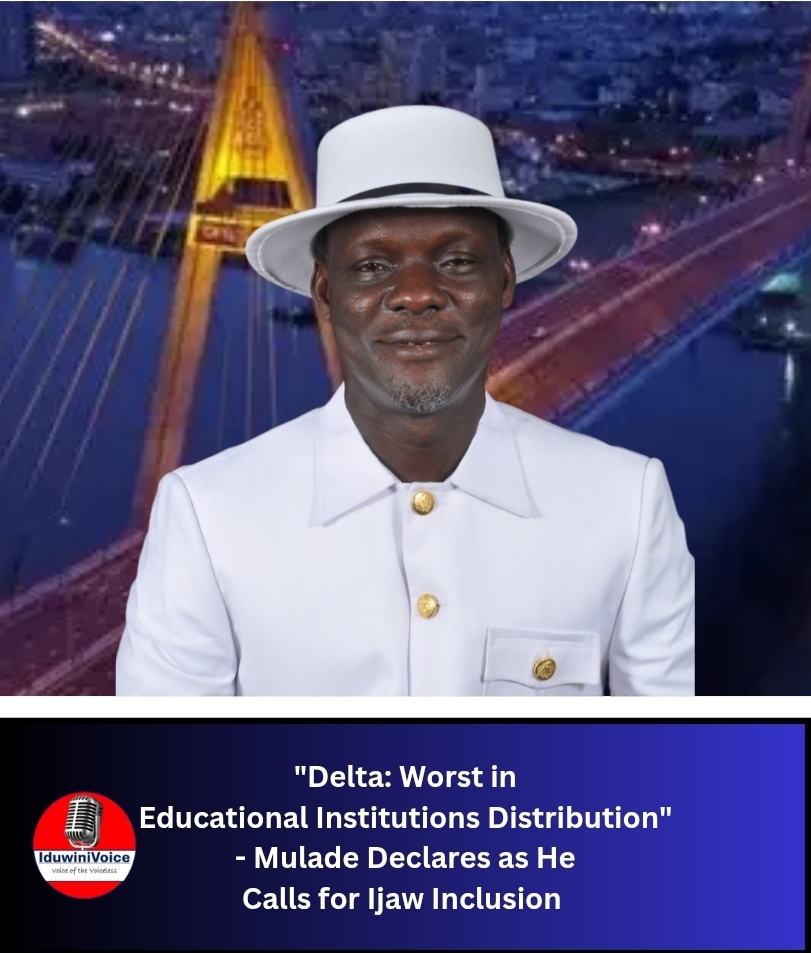
By: Favour Bibaikefie
A development Ijaw leader and development advocate, Comrade Mulade Sheriff, PhD, has accused the Delta State Government of systematic marginalisation and deliberate neglect of Ijaw communities, particularly in the area of educational development and institutional presence.
Mulade, who described the situation as “unjust, provocative and unacceptable in a democratic society,” said the continued exclusion of Ijaw areas from the siting of state-owned educational institutions represents a clear case of structural discrimination, despite the region’s enormous contribution to the economic survival of Delta State.
Dr. Mulade, “It is painful and unacceptable that a people whose land produces greater portion of wealth sustaining this state are treated as second-class citizens when it comes to development especially in the area of higher educational institutions. This is not only unfair; it is dangerous for the unity and future of Delta State.”
The Ijaw-born activist listed the existing state-owned tertiary institutions in Delta State and pointed out that almost all are concentrated outside Ijaw territories, reinforcing a long-standing pattern of exclusion as regards State-Owned Universities such as:
– Delta State University, Abraka;
– Southern Delta State University of Science and Technology, Ozoro; Southern Delta University of Science and Technology, Orerokpe Campus;
– Dennis Osadebay University, Asaba;
– University of Delta, Agbor;
– State-Owned Colleges of Education and Health Institutions:
– Federal College of Education (Technical), Asaba;
– College of Education, Edjeba Road, Warri;
– Delta State College of Physical Education, Mosogar;
– School of Midwifery, Asaba;
– State School of Nursing, Edjeba, Warri;
– College of Nursing Science, Sapele;
– Delta State-Owned Polytechnic Institutions:
– Delta State Polytechnic, Ogwashi-Uku;
– Delta State Polytechnic, Otefe-Oghara;
– Delta State Maritime Polytechnic, Burutu; (with the poorest infrastructure and lacks).
Mulade stressed that out of all these institutions, only one, the Delta State School of Marine Technology, Burutu is located in Ijaw land, a reality he described as “appalling, insulting and indefensible.”
“One institution for an entire ethnic nationality that contributes massively to Delta State’s oil wealth is not just marginalisation; it is a deliberate policy of neglect,” he declared.
The rights activists further lamented that while Ijaw communities bear the environmental burden of oil exploration including polluted rivers, destroyed farmlands and health risks, they are consistently denied the benefits of development, especially in education.
“Our youths are denied opportunities not because they lack potential, but because the government has refused to bring development to our doorsteps. This imbalance is breeding frustration, and must be corrected urgently,” Mulade warned.
The Ibe-Sorimowei of the ancient and oil-rich Gbaramatu Kingdom in Delta State, Chief Mulade Sheriff strongly appealed and called on Governor Sheriff Oborevwori to rise above politics, sentiment and take deliberate steps to correct the imbalance by prioritising the siting of new educational institutions in Ijaw areas, upgrading existing infrastructure and appoint qualified Ijaw sons and daughters as Vice-Chancellor and other principal officers in Delta educational architecture as compensation now.
“Governor Oborevwori must show that he is a governor for all Deltans, not for a select few. The Ijaw people deserve fairness, inclusion and respect. Educational development is not a favour; it is our right,” he stated.
He warned that continued neglect of Ijaw areas could deepen feelings of alienation and undermine the sense of belonging among the people.
Demand for Equity and Justice
Mulade concluded by calling on civil society groups, traditional rulers, youth organisations and stakeholders across Delta State to speak out against structural injustice and demand a more equitable distribution of development.
“This is not just an Ijaw issue; it is a justice issue. A state cannot develop sustainably when a significant part of its population is consistently excluded,” he said.
Opinion
Ijaw Nation Is Watching Delta State 2026 Budgetory Allocations – Dr. Mulade Warns
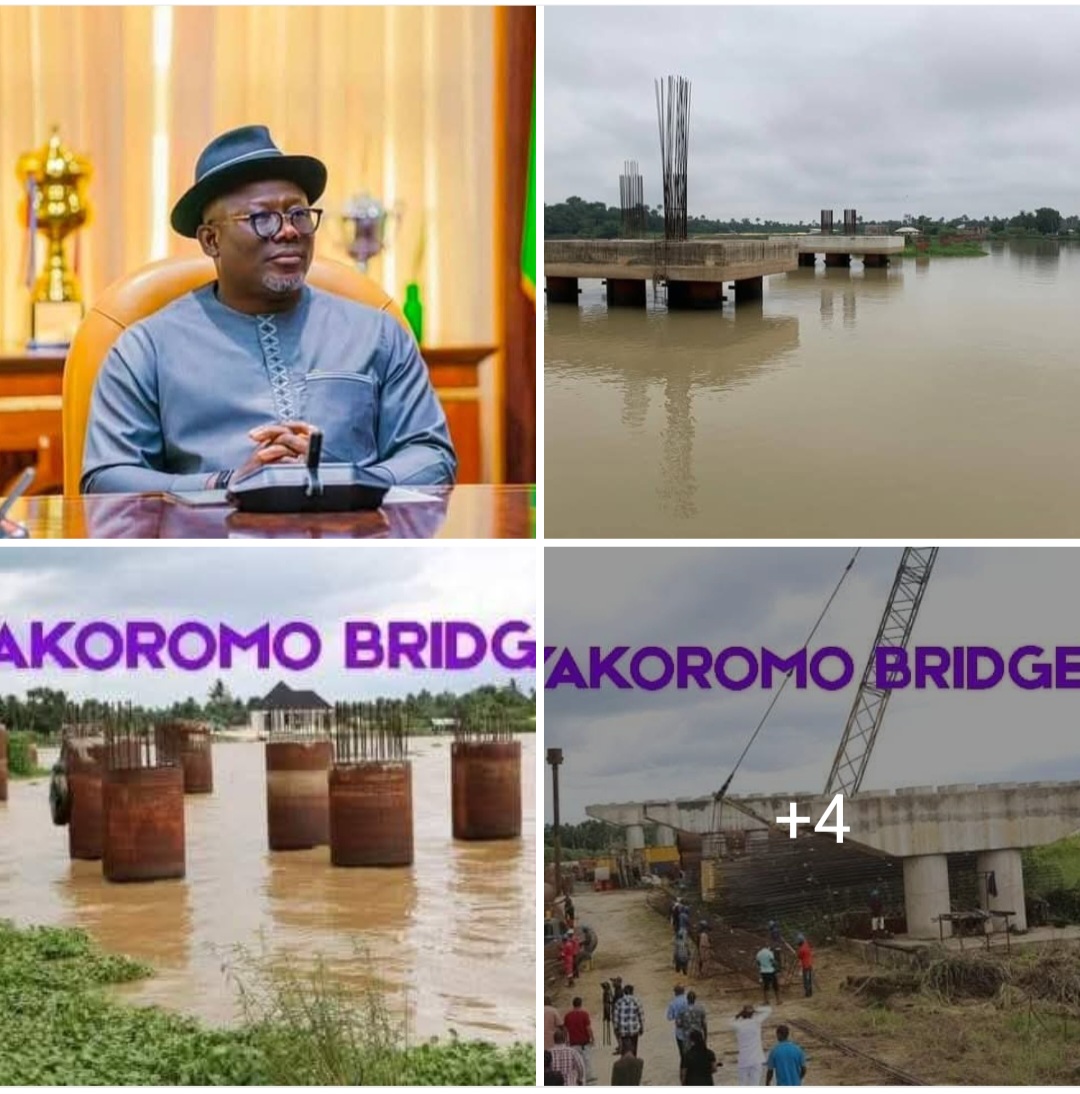
* As Group Gears Up to Endorse Governor Sheriff Oborevwori for 2027
By: Divine Perezide
Ahead of the 2027 general elections gradually inches closer, the political terain have seen a lot of endorsements at various levels. In Delta, there have been reports of a planned endorsement of governor Sheriff Oborevwori as the sole candidate by a group of Delta Ijaws. This has however, triggered reactions from many stakeholders, including a prominent Ijaw leader, peace and development advocate, Comrade (Chief) Mulade Sheriff, PhD, who has declared that Ijaw votes in 2027 would be determined by projects allocated, adequately funded to completion in the 2026 budget.
The renowned human and environmental rights activist made the declaration at a press briefing after an expanded stakeholders meeting in Warri on behalf of Ijaw Ethnic Nationality in the state.
According to the Ibe Sorimowei of the ancient Gbaramatu Kingdom, the adequate inclusion and funding of projects in the riverine areas will serve as critical consideration for political support, and riverine communities predominantly occupied by the Ijaws and Itsekiri ethnic nationalities.
While he commended the infrastructural development stride by governor Oborevwori in the upland areas, Mulade however lamented the absence of such infrastructural revolution in the riverine areas of the state despite the population density and huge revenue contributions to the state as host to multinational oil and gas companies.
He said, “I want to sincerely appreciate His Excellency, Rt. Hon. Sheriff Oborevwori, for the infrastructural development, which I described as infrastructural revolution in the state, particularly in the upland, and your proposed commissioning of the reconstructed Odimodi-Ogulagha road earlier constructed by SPDC in the 1980’s for their operational convenience and community residents.
“It is imperative to state that some Ijaw communities such as Ogulagha, Torugbene, Oporoza, Akugbene, Ojobo etc. are more densely populated than some local government headquarters in the upland, but they are deliberately deprived of development because of the so-called claim of terrain challenges.
“These communities host multinational oil and gas companies contributing immensely to the state revenue, but without any significant projects,” he lamented.
The Ibe-Sorimowei who reminded the governor of how the Ijaws adopted, supported and stood by him all through the election season, also gave the assurance of massive Ijaw votes come 2027, but one that must be backed by the governor’s commitment to development through massive projects inclusion for the area.
“We (the Ijaws) have created a conducive atmosphere to boost oil and gas production, making Delta the richest state; support security, douse restiveness and support economic stability. It is time for the governor to reciprocate through the 2026 budget with tangible legacy projects,” he asserted.
Speaking further he said, “Your Excellency, permit me to draw your attention to some expected critical projects that must be considered for the Delta Ijaw nation: the Ayakoromo bridge, Omadino-Okerenkoko-Kokodiagbene-Escravos road, Aladja-Ogbe-Ijoh Road, Ojobo-Torugbene road, among others.
“Build a first class Health Centre/General Hospital in riverine community, particularly at Ogulagha Town, to compensate the people for their huge contributions to the state revenue.
On education, he appealed that, “It is worthy of note that every ethnic group in Delta State hosts state university except the Ijaws and the Itsekiris. I want to strongly and sincerely appeal to His Excellency, Rt Hon Sheriff Oborevwori once again, to consider the upgrading of the Delta State Maritime Polytechnic, Burutu, which is a moribund polytechnic, to a campus of the Delta State University, Abraka. This will position the state to explore the blue economy opportunities. Equally too, the state government should, without delay, build a campus of Dennis Osadebe University at Koko to give sense of belonging to the Itsekiris with a special focus on agriculture for Deltans.
“The above mentioned projects constitutes significant live-wire for the Delta Ijaw, and will translate into votes come 2027. We can assure His Excellency, Rt Hon Sheriff Oborevwori, of 100 percent of the entire Ijaw votes come 2027.
“The consideration of revolutionary projects in the riverine areas in the 2026 budget will give a sense of belonging to the people for their huge contributions. Moreover, your commitment to development will write your name in gold, not just seeking their votes during elections.”
Opinion
“Tompolo: A Movement of Transformation” – Prof. Binebai,
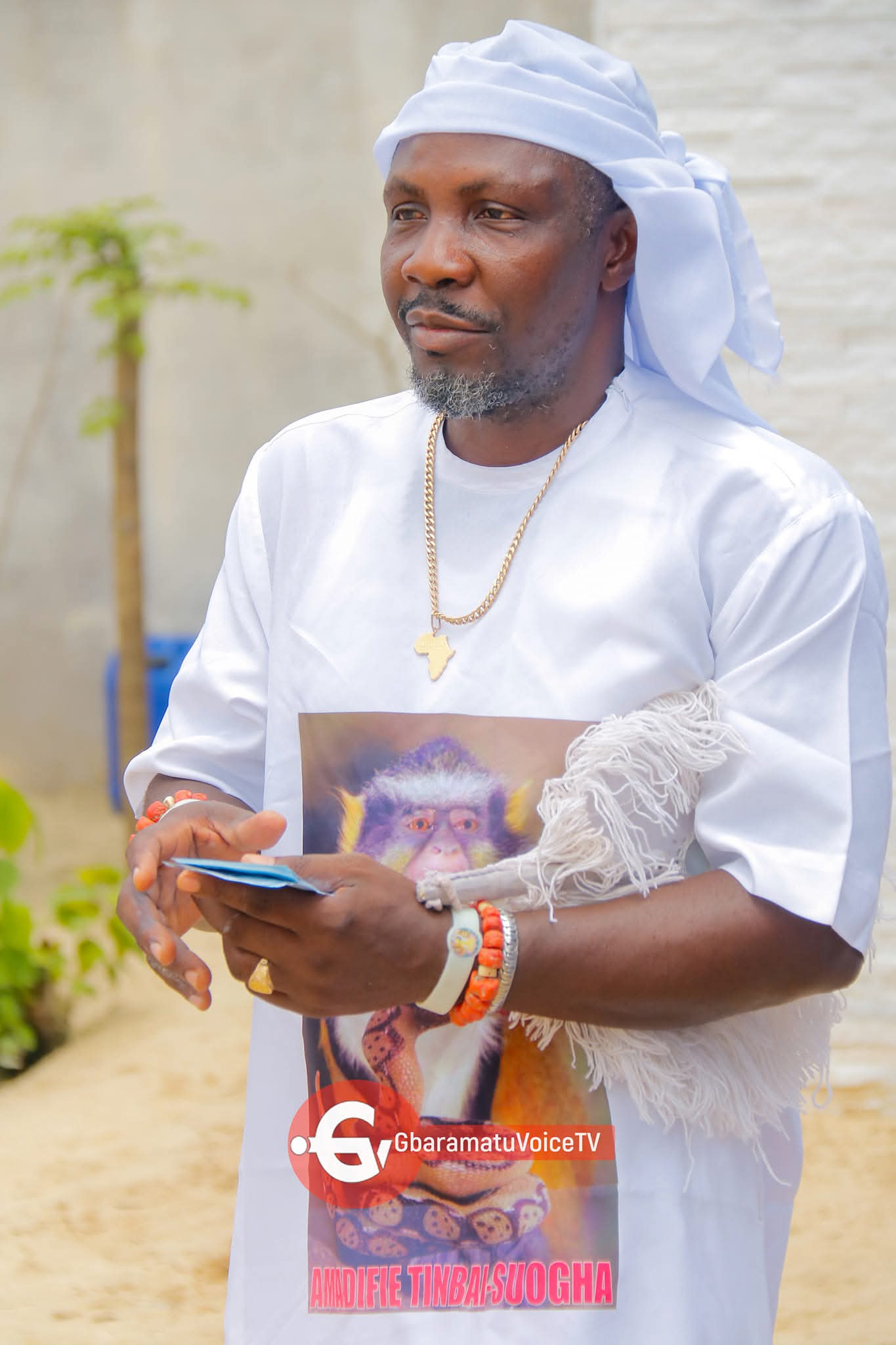
“Tompolo: A Movement of Transformation” – Prof. Binebai,
IduwiniVoice
Renowned Delta-born Professor of Professor of Drama, Dramatic Theory and Criticism, and an Auratorial god, Prof. Benedict Binebai has yet described High Chief Dr. Government Oweizide Ekpemupolo, popularly known as Tompolo as ‘A Movement of Transformation”
In his words, “Tompolo is a multifaceted entity, a veritable institution that defies categorisation, embodying a dynamic force that permeates various aspects of society. As an agency, it represents a powerful catalyst for change, driving progress and innovation in its wake. As a model, Tompolo exemplifies excellence, demonstrating a paradigm of leadership that is at once inspiring and aspirational. His influence extends far beyond the realm of politics, permeating the cultural, religious, and spiritual spheres, where he fosters a sense of unity and shared purpose.
“As a movement, Tompolo is a seismic force, shaking the foundations of complacency and stagnation, and galvanising individuals to strive for a brighter future. His impact is felt across generations, as he empowers young and old alike to become agents of positive change in their communities. In the realm of politics, Tompolo’s leadership has been characterised by a commitment to justice, equality, and the empowerment of the marginalised. His vision for a more equitable society has inspired countless individuals to work towards a common goal, forging a sense of solidarity and shared humanity.
“Culturally, Tompolo has been a luminary, celebrating the rich diversity of Nigerian heritage while promoting a sense of national identity and pride. His influence has helped to preserve traditional values while embracing modernity, creating a unique blend of old and new. Spiritually, Tompolo’s message of hope and redemption has resonated with people from all walks of life, offering a sense of solace and comfort in times of uncertainty. His leadership has embodied a sense of compassion and empathy, inspiring a new generation of spiritual leaders to follow in his footsteps.
“In every sense, Tompolo is a transformative force, a shining example of what can be achieved through dedication, perseverance, and a commitment to the greater good. He is an impeccable movement because his philosophy, his love for society, his cultural activism, his religiosity and leadership grace and skill which is human centered is attracting a large followership, particularly in the Nigerian Delta, where his impact is deeply felt.”
This assertions resonates well with popular sentiments held not just across the Delta of Nigeria but far beyond. Tompolo’s increasing popularity waxes stronger on the pillars of his dedication to homemade ijaw naturality, largeheartedness, stern capability in securing critical national economic assets and the environment, and above all, a detribalized collaborative efforts with other critical stakeholders within and outside the Niger Delta for peace, stability, infrastructural development, and economic process.
(c) IduwiniVoice

